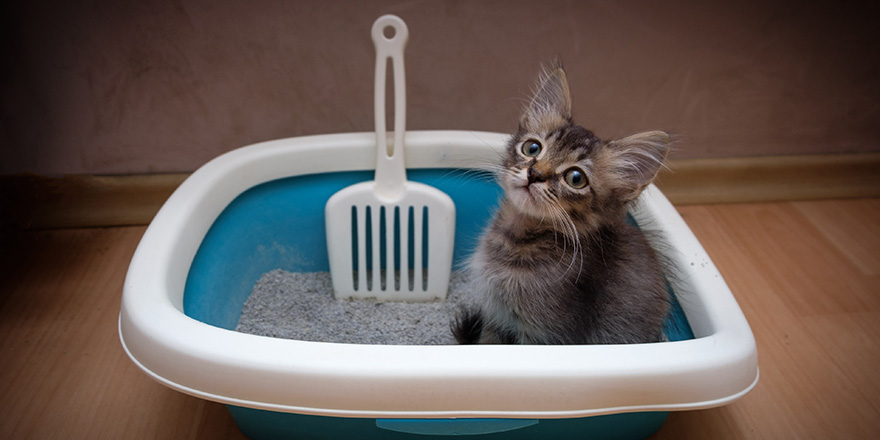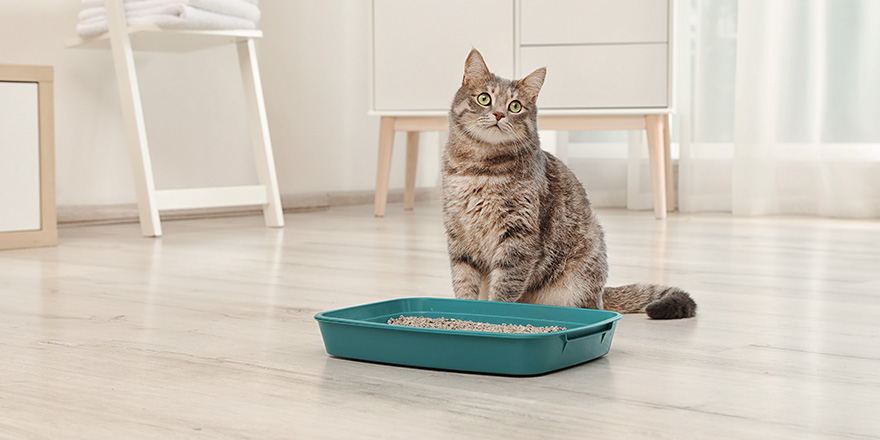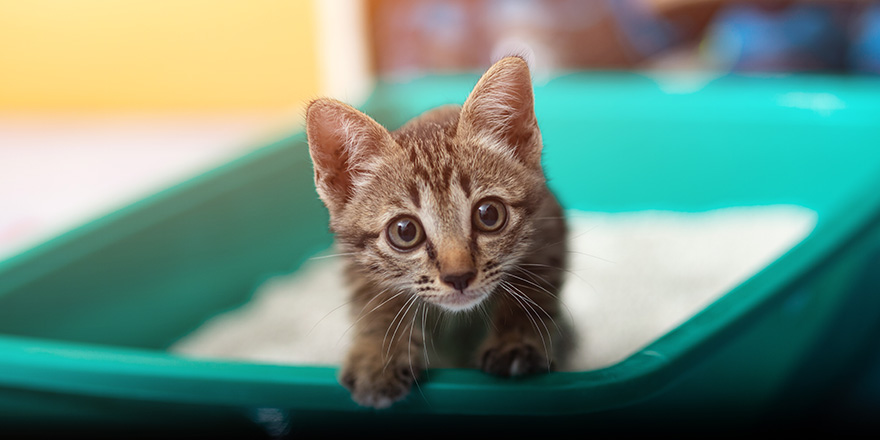After a cat uses their litter box, they usually cover their waste up with surrounding litter that hasn’t been used by other cats. This is typical cat behavior for domestic cats. In the wild, cats do a similar thing, but they use dirt, sand, or rocks because that’s what they have available. When a cat’s litter box is full of uncovered poop, there may be a problem that you need to help your cat address.
Reasons That Your Cat Doesn’t Cover Their Poop
One of the best things about owning cats is that they use litter boxes. With dogs, you have to walk around with doggy poop bags waiting for them to finish their business so that you can pick up their waste and dispose of it. Cat waste requires less physical handling because of litter boxes and poop scoops. There shouldn’t be any need for you to pick up cat poop unless your cat has had an accident or has litter box aversion and is still learning to feel comfortable using them.

However, that doesn’t mean that you won’t experience some kitty litter issues throughout your cat’s life. When you find that your cat is leaving their poop uncovered, that’s a sign that something isn’t quite right. Cats naturally cover their poop; they’re very clean creatures and they want their surroundings to be clean too. As such, we’ve gathered together some information on the common reasons that your domesticated cat might be having litter box problems:
Medical Issues
Health conditions that cause pain using the litter box may put your indoor cats off using their tray to urinate or dispel waste.
Urinary Tract Infection
Cats are prone to Urinary Tract Infections, which is bacterial infection in the cat’s bladder or urethra. One of the most common causes of a UTI in cats is Escherichia Coli, the bacteria that is found in poop. Considering how cats use their bathroom facilities, it’s not surprising that they can give themselves UTIs this way. Dehydration can also lead to UTIs and make them worse – always ensure that your cat has fresh, clean drinking water.
IBS
As well as UTIs, some cats can suffer from Irritable Bowel Syndrome, which can cause either diarrhea or constipation – or both. IBS is an extremely uncomfortable chronic condition with no cure and a huge number of possible symptoms. We see it all the time in humans, but no one ever seems to mention that it’s possible for cats to have the condition as well. A cat with this kind of discomfort is likely to have inconsistent bowel movements, and they may not always make it to their litter box in time.
Depending on how much they’ve used their litter box that day, you may also notice some bright red blood in their stool. Bright blood means that the source of bleeding is close to the end or opening of the rectum, while dark blood would mean the bleed is further inside their body. If your cat becomes lethargic or stops eating or drinking, take them to your vet immediately. If they only have bright blood in their stool, check their rear end, they could just be incredibly sore and have caused an abrasion through straining.
IBS isn’t the only bowel-related medical problem that can cause litter box woes, but it’s a common one.
Paw Injuries
A kitty with an injury to the soft pad of their paw is not going to want to spend an unnecessary amount of time covering up their waste. You’ll be able to tell if the problem is an injury by watching your cat walk around and checking their paws yourself. If the paw pad is freshly injured or seems irritated, be sure to have your cat checked out by a vet.
Certain cats will often lean up on their front paws when having a bowel movement, so an injury like this could mean they aren’t able to go to the bathroom in the way that they want to.
Hip Dysplasia
Joint pain caused by hip dysplasia could also be playing a role in hurting your cat’s bathroom habits. Elderly cats, especially, are prone to experiencing hip pain. This could make the journey into their litter box unnecessarily uncomfortable, which then makes them stop using their litter box properly or at all. Spend time with your cat during the day to see if they’re walking strangely, and get them to a vet if you feel like they’re in pain or they’re obviously showing signs that something is wrong. If your cat is elderly and/or suffering from this condition, give a low-sided litter tray a try!

Issues with Litter Boxes
If the problem isn’t related to injury or the act of using the litter tray, your cats could have issues with the litter boxes in your home. Having litter allows your cat to bury their waste, but the type of litter you’re using is just one of the many potential problems you could inadvertently be causing your cat.
Multi-cat Houses
Do you have multiple cats in your home? Multi-cat households need more than one litter tray because cats use the bathroom a lot during the day and if you’re not at home to dispose of the waste, they’ll go wherever they can.
Large Cats
Big cats also have their own requirements. If your cat is on the heavy side, you’ll want to provide them with a larger litter box because they don’t always realize that they aren’t fully situated in the tray before doing their business. This leads to poop ending up on the sides of the box and on the floor, which your cat can’t cover well. Cats prefer having a larger area to poop in so that they can adequately cover it up and leave without getting stressed out. Your cat should be able to comfortably turn around in its box and do a digging motion without causing a huge mess.
Location
Some cats are very private. Rescue cats, especially, will feel uncomfortable using their litter box if it’s not in a well-hidden place. That doesn’t mean you need to hide their litter tray away or anything, just give them a private area to poop. You wouldn’t keep the bathroom door open when guests are around – think of it like that when deciding where to put your cat’s litter box or what type to buy. Obviously, a hooded or covered box is ideal for homes where there isn’t anywhere private for your cat to use as a bathroom.
Be sure to keep your cat’s litter boxes away from loud areas of your home or items like washing machines that can startle your cats while they’re trying to use their box. If a cat gets startled or distracted, they’re more likely to forget about covering up their waste. On that note, you should also endeavor to keep your cat’s things away from anything your dog owns if you have a pup in the household, too. They won’t appreciate sharing the same place.
Territorial Declaration – Dominant Cat Behavior
Dominant cats will purposefully leave their waste uncovered to show that they are the boss of the household. Watch out for this kind of dominant behavior in multi-cat households because it can get a little rough if you’ve got cats with alpha personalities who are constantly getting into scraps. Leaving poop uncovered is how a cat – yes, even an indoor cat – marks their territory. You might want to have more than one litter box around if this keeps happening.
Natural Inclinations
Although more dominant cats will refuse to bury poop, there may be other instinctual or natural reasons that your cat is leaving their poop uncovered. Although wild cats can and do sometimes bury their poop, it’s believed to be a learned behavior. It’s possible that domestic cats only bury their poop because they see their human owners as the dominant cat and are trying to show themselves as submissive. Alternatively, it could be that they’re burying it because years of domestic cat behavior has told them that they should.
Animal behavior consultants are a great source of knowledge for learning more about instinctual cat behaviors like this. They’ll certainly have a better insight than your local vet, who may not be as well-versed in wild cat behaviors. That’s not to say your vet isn’t a good place to start, though!

What You Can Do to Get Your Cat to Cover Her Poop
Now that you know all about the reasons your cat isn’t covering up their waste, let us tell you what you can do about it. When your cat suddenly stops covering poop, help them remember why they have a positive association with their litter box and the area that surrounds it. This should be a calming area for your cat – no one wants to be stressed in the bathroom.
Kitten Training
Training your kitten in litter box habits is the best way to ensure they grow to be a cat who is conscious about where they go to the bathroom and how they use their litter box. Your cat’s behavior is much easier to mold when they’re younger, and you can use things like treats and clicker training to positively reinforce their new litter box habits.
Reduce Stress
Stressed cats don’t have good bathroom etiquette. Stressed cats hide, and act out, and they’ll poop fast without thinking about needing to cover it up because they want to remove themselves from a stressful situation. Figure out what is causing your cat to behave erratically – is it another cat’s presence? Something new in your home? Reduce their stress and their habits should revert back to normal.
Optimize Litter Facilities
As we’ve mentioned, cats prefer private bathroom areas. If you can’t section off a quiet part of your home for their litter trays, consider putting them in your own bathroom or setting them up with enclosed litter boxes that have a swinging door entrance. The more private the area, the happier your cat will be about using it. Plus, a hooded litter box will reduce the spread of litter pieces!
Remember: Give your cats their own territory to poop in. Your cat likes privacy.
Talk to a Veterinarian
Veterinarians have great advice to offer when it comes to cats acting strange. Bathroom habits are among the most common topics that vets are asked about, and they’ve probably heard everything before. If your cat’s yearly check-up is coming up soon, there’s no harm in having a quick chat with your vet to get their advice or suggestions for giving your cat a happier litter box experience.
You should also be seeking veterinary advice for any potential bowel-related medical issues.
FAQs:
This could be your cat trying to expand their pooping territory or they may be having issues with their bathroom habits. Cats don't like change, so different litter brands or a new litter box will take them a bit of time to get used to. They may also be experiencing painful medical problems, which are making it difficult for them to get to their box in time.
Whether you have one cat, two cats, or more, you should strive to change out the litter of your cat's tray every couple of days and clean out the poop once or twice a day. It really depends on how many cats you have because more cats always equals more smell, waste, and used litter. Whether you have kittens or adult cats, keep their bathroom clean for them so they don't get stressed out.







